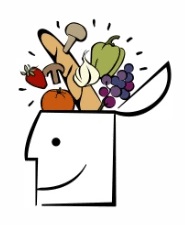Food for thought
 No matter how smart we think we are if we are honest we are interested in improving our brain function. At the very least we are interested in not losing any of it. The pharmaceutical industry hasnít been much help. The good news is that nature still has a few tricks for us. No matter how smart we think we are if we are honest we are interested in improving our brain function. At the very least we are interested in not losing any of it. The pharmaceutical industry hasnít been much help. The good news is that nature still has a few tricks for us.
Omega 3 fatty acids feed the brain. When we think of Omega 3ís most people think of Salmon or Cod Liver Oil. There are actually some ground based animals that provide hefty Omega 3ís as well. Any meat animal that lives entirely from nature contains Omega 3ís. That includes grass fed animals such as cows, sheep, goats, deer, elk, and other wild animals. It also includes truly free range chickens, the ones that eat the bugs and weeds, not the ones that look at nature through the door to their yard and eat what is fed to them by the farmer. Plants that provide Omega 3ís include flax and olive oil (cold pressed only) as well as hemp oils and seeds and walnuts and cold pressed walnut oil. Walnuts are also a great source of Omega 3ís.
Coconut Oil feeds the brain as well. This saturated fat contains medium chain fatty acids that the body handles differently that other types of fat. There have been studies where large quantities of this oil reverse some of the major symptoms of Alzheimerís.
Antioxidant rich foods are important to our brain health. Things such as blueberries get rid of the free radicals that can cause damage to our brains. Grapes contain an antioxidant called resveratrol that has been shown to protect the brain. Strawberries and prunes to round out the best fruits supplying nutrients that trigger dopamine release.
Getting enough clean water in your diet is another key. A dehydrated brain has trouble functioning.
Exercise has been shown to protect your brain from the ageing process, as well as from alcohol damage. High Intensity Interval Training, what we used to call sprints, has shown great promise in protecting and feeding the brain. In order to get the most from them you will want a strong core, so your body can work that much harder without injury.
Proteins have been shown to increase dopamine in the brain. The brain uses dopamine to stimulate the heart, regulate the flow of information through our brains, control movement, and allow humans to experience feelings of passion and pleasure. Beets supply the amino acid called betaine that aids in the regulation neurotransmitters like dopamine. Artichokes and avocados have also been found to increase dopamine levels. Tyrosine from ripe bananas helps regulate and stimulate dopamine levels, increasing memory and alertness. Quercetin, from apples has been shown to aid in the prevention of neurodegenerative diseases by triggering the production of dopamine in the brain.
Some people swear by a Mediterranean style diet. The one that works the best severely limits grains and includes generous portions of olive oil and nuts.
Turmeric has been shown as a breakthrough substance for cognitive decline. Taking as little as one gram, or roughly one-quarter of a teaspoon, of turmeric powder or extract daily, it turns out, is enough to produce mind-blowing improvements in dementia symptoms. This is true whether the spice is used for cooking or as a supplement. Some feel this is due to the fact that turmeric reduces inflammation in the body, including the brain.
Walnuts were mentioned before. In addition to providing Omega 3ís they also are known to raise melatonin levels by a whopping three times, promising relief from sleeplessness and insomnia. This nut is a powerhouse of nutrients - manganese, copper, iron, calcium, phosphorus - the stuff of a good, healthy, happy body. Walnuts contain more antioxidants, folic acid and vitamin E than any other nut.
Eating well and taking care of our bodies seems to make a big difference in taking care of our minds.
Sources:
http://www.naturalnews.com/040169_superfoods_brain_function_daily_diet.html
http://fitness.mercola.com/sites/fitness/archive/2013/05/03/exercise-helps-protect-brain.aspx?e_cid=20130503_DNL_art_2&utm_source=dnl&utm_medium=email&utm_content=art2&utm_campaign=20130503
http://www.naturalnews.com/040537_brain_foods_dopamine_production.html
http://www.naturalnews.com/040730_Mediterranean_diet_cognitive_decline_anti-aging_foods.html
http://www.naturalnews.com/040858_turmeric_Alzheimers_Disease_dementia.html
http://www.naturalnews.com/040837_walnuts_healthy_nuts_brain_food.html
|
|
|
Disclaimer: The entire contents of this website are based upon the opinions of the author(s). Individual articles are based upon the opinions of the respective author. The information on this website is not intended to replace a one-on-one relationship with a qualified health care professional and is not intended as medical advice. It is intended as a sharing of knowledge and information from the research and experience of the authors. You are encouraged to make your own health care decisions based upon your research and in partnership with a qualified health care professional.
|
|
|